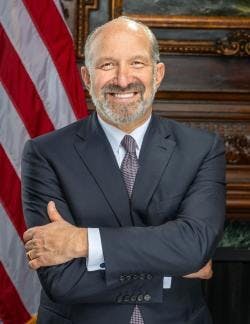Five telecom industry groups urge Trump administration to end BEAD program delay
A group of broadband-related industry advocacy groups is calling on the Trump administration to lift the delay in administering funds from the $42.5 billion Broadband Equity Access and Deployment (BEAD) program.
Jointly written by leaders of the National Rural Electric Cooperative Association (NRECA), NTCA, Telecommunications Industry Association (TIA), USTelecom and WTA, the letter urged the administration to “eliminate the unnecessary and burdensome program requirements imposed by the Biden Administration and enable the States to move forward quickly with implementation.”
It follows an April letter signed by 115 bipartisan state lawmakers, which also expressed concern about delaying states' progress with BEAD.
“Our members are the companies that have been the boots on the ground building, maintaining, and supplying the equipment for the broadband network infrastructure in rural America, and we cannot overstate the importance of getting the BEAD program on track,” the group wrote. “These rural communities have waited long enough for next-generation broadband that will unlock massive economic opportunities, and they cannot afford more program delays.”
Revising BEAD
Due to the slow progress of the Broadband Equity, Access, and Deployment (BEAD) program, the new administration’s 90-day delay by the Department of Commerce is not surprising.
In April, the U.S. Department of Commerce said in the notice that it “is currently undertaking a detailed review of the BEAD program to remove unnecessary rules and mandates, improve efficiency, take a more technology-neutral approach, cut unnecessary red tape, and streamline deployment.”
“Under my leadership, the Commerce Department has launched a rigorous review of the BEAD program,” said Howard Lutnick, Secretary of Commerce. “The Department is ripping out the Biden Administration’s pointless requirements. It is revamping the BEAD program to take a tech-neutral approach, rigorously driven by outcomes, so that states can provide internet access at the lowest cost. Additionally, the Department is exploring ways to cut government red tape that slows down infrastructure construction. We will work with states and territories to quickly eliminate delays and waste. Thereafter, we will move quickly to implementation to get households connected.”
Lutnick is not the only government official that’s proposed changes to the BEAD program.
In March, Congressman Richard Hudson (R-NC), who serves as Chairman of the Communications and Technology Subcommittee on the House Energy and Commerce Committee, led Republican members of the subcommittee in introducing the Streamlining Program Efficiency and Expanding Deployment (SPEED) for the BEAD Act.
Proposed legislation, such as the SPEED for BEAD Act, suggests a "technology-neutral" approach, allowing states to use various technologies (including fiber, fixed wireless, and satellite) for BEAD projects, rather than favoring fiber exclusively. This could lead to faster deployments in areas where fiber installation is not feasible or cost-effective.
States’ holding pattern
The Trump administration’s delay has put states’ broadband plans based on BEAD in a holding pattern.
To date, all 50 states have had their initial BEAD proposals approved.
Delaware, Louisiana and Nevada are the only states to have submitted their final proposals for public comment.
Industry groups emphasized in their letter that states should have the final say in how the BEAD program is carried out.
“The BEAD program was designed for the States to carry out, and the States should remain in the driver’s seat, empowered to use their expertise in determining the best broadband technology solutions for their residents,” the group wrote. “We recognize that there is no one-size-fits-all approach to solving rural broadband challenges and that every technology will have an important role to play in BEAD.”
This group is not the only one calling for a lift on the delay.
Showing that broadband access is a bipartisan issue, 100 state lawmakers from 28 states sent a letter to U.S. Commerce Secretary Gina Raimondo, requesting that any changes to the BEAD program be optional rather than mandatory. Representatives emphasized mandatory changes could undo their BEAD plans and delay broadband deployment by a year or more.
“We are concerned that mandatory changes will undermine state authority over state programs (a central feature of the Bipartisan Infrastructure Law), undo our BEAD and Digital Equity (DE) plans, and delay broadband deployment by a year or more.
Earlier this month, the Trump administration called for an end to DE plans.
Enacted under the Infrastructure Investment and Jobs Act, igital Equity Act provides for $2.75 billion for grants through three separate digital equity programs administered by the Department of Commerce’s National Telecommunications and Information Administration (NTIA): The State Digital Equity Planning Grant Program (DE State Planning Program), the State Digital Equity Capacity Grant Program (DE Capacity Program) and the Digital Equity Competitive Grant Program (DE Competitive Program).
On May 8, President Donald Trump declared in a post on his Truth Social platform that the Digital Equity Act was unconstitutional and that he would be ending the "Digital Equity Program" immediately.
President Trump called out the program’s “woke handouts based on race,” and said that the program is an “ILLEGAL 2.5 BILLION DOLLAR GIVEAWAY.”
Local businesses feel effect
The administration’s delay in administering the BEAD program is also having an impact on local businesses, including those in Louisiana, which became the first state to have its final proposal approved in January.
Louisiana’s Final Proposal outlines its plan for using the more than $1.3 billion in allocated BEAD funding to connect 140,030 households and businesses.
However, the pain of the Trump administration’s delay is now being felt by local businesses, such as ClearPath Fiber, a local FTTH provider, and EPC, a broadband construction company.
David Herring, CEO of ClearPath Fiber, wrote in a letter to Lutnick that if it had not been for the administration’s delays, it could have already connected a portion of its customer base with fiber-based broadband.
“Every hour lost to indecision weakens the very future we’ve been fighting to build,” he wrote. “This isn’t just about missed deadlines — it’s about missed opportunity. In the time it takes to “reassess” or “reconfigure,” we could have 20% of our customers connected — real families, real businesses, real students gaining access to opportunity.”
Another issue is the Commerce Department’s emphasis on being technology-neutral, which calls for focusing on using lower-cost satellite internet services to more rapidly deploy service to more households.
Initially developed with a focus on fiber-based networks, the Commerce Department’s changes could mean that Elon Musk’s Starlink would have easier access to BEAD funding.
Herring emphasized that fiber, which can support multiple gigabit speeds, will provide a future-proofed network architecture.
“The BEAD program’s original fiber-first focus remains the right approach — delivering long-term value, local jobs, and true infrastructure resiliency,” he said. “Shifting those priorities toward satellite is a mistake. It may seem convenient, but it sacrifices the high-performance future our communities deserve for short-term headlines. And it further delays real progress in areas that already feel forgotten.”
Likewise, EPC, which two brothers founded in 2016, is also feeling the pain of the administration’s inaction. Josh Etheridge, Co-Owner, EPC, wrote in a letter titled Where Is the Speed for BEAD?, that EPC had to lay off a significant portion of its contracted workforce.
“Louisiana was promised millions to start broadband construction by April 2025, but it has not received them,” he wrote. “This is killing my US-based company and requiring me to lay off 80% of my contracted workers,” he wrote. “We can’t wait another 90 days. This letter from a BEAD contractor, with $270 million in broadband deployment projects, demonstrates how politics is undermining any “benefit of the bargain.”
For related articles, visit the Broadband Topic Center.
For more information on high-speed transmission systems and suppliers, visit the Lightwave Buyer’s Guide.
To stay abreast of fiber network deployments, subscribe to Lightwave’s Service Providers and Datacom/Data Center newsletters.
About the Author
Sean Buckley
Sean is responsible for establishing and executing the editorial strategy of Lightwave across its website, email newsletters, events, and other information products.



